Cabaret
Know the Score
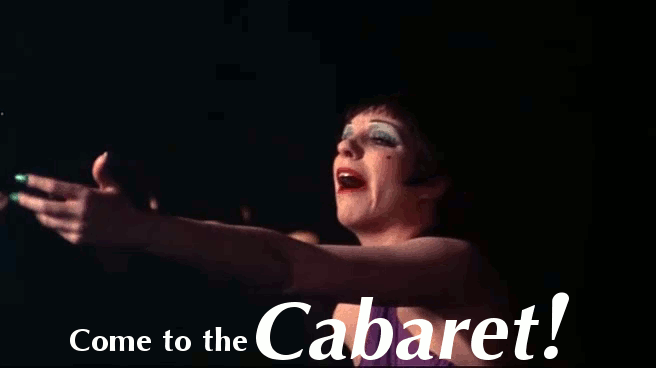



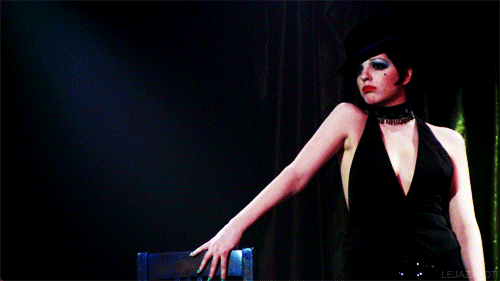
You know what they say
about those who don't learn from history...

In 1995, this film was selected for preservation in the United States National Film Registry as being deemed "culturally, historically, or aesthetically significant."
Cabaret is a 1972 American musical film directed by Bob Fosse and starring Liza Minnelli, Michael York and Joel Grey.
The film is set in Berlin during the Weimar Republic in 1931, before the rise of the Nazis under Adolf Hitler.
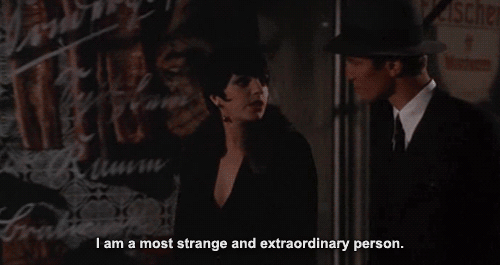
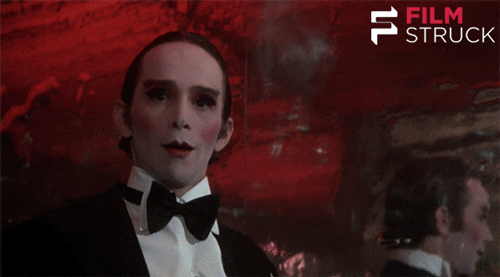
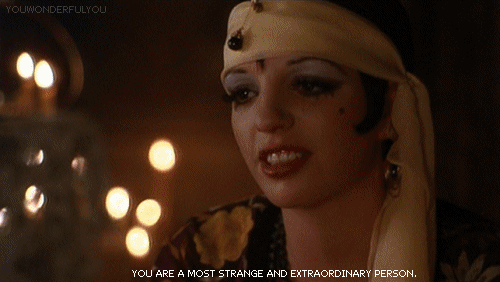 Cabaret was nominated for 10 Academy Awards in 1973, and nearly performed a clean sweep, winning 8, including
Cabaret was nominated for 10 Academy Awards in 1973, and nearly performed a clean sweep, winning 8, including
It won 7 BAFTA awards, including Best Film, Best Direction and Best Actress, and the Golden Globe Award for Best Motion Picture (Musical or Comedy).
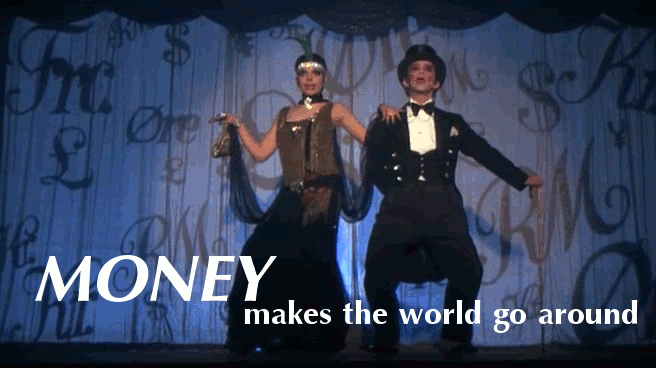
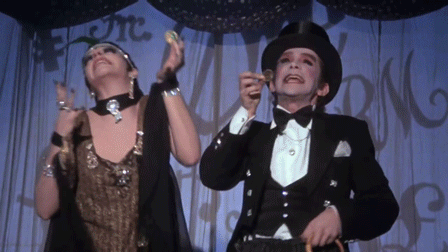
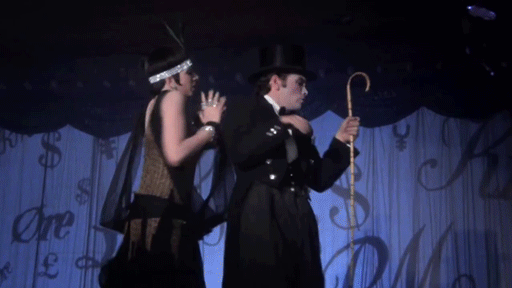
Cabaret (1972)
Subtitled
👇♪ 📽 ♪ 👇
Cabaret is a 1972 American musical film directed by Bob Fosse and starring Liza Minnelli, Michael York and Joel Grey.
The film is set in Berlin during the Weimar Republic in 1931, before the rise of the Nazis under Adolf Hitler.



- Best Director (Bob Fosse),
- Best Actress (Liza Minnelli),
- Best Actor in a Supporting Role (Joel Grey),
- and winning for Cinematography,
- Editing,
- Music,
- Art Direction (Rolf Zehetbauer, Hans Jürgen Kiebach, Herbert Strabel)
- Sound
It won 7 BAFTA awards, including Best Film, Best Direction and Best Actress, and the Golden Globe Award for Best Motion Picture (Musical or Comedy).



Cabaret (1972)
Subtitled
👇♪ 📽 ♪ 👇
Differences Between
Film & Stage
Version The film is significantly different from the Broadway musical.
Version The film is significantly different from the Broadway musical.
In the stage version, Sally Bowles is English (as she was in Christopher Isherwood's "Goodbye to Berlin").
In the film version, she is American.
The character of Cliff Bradshaw was renamed Brian Roberts and made British (as was Isherwood, upon whom the character was based) rather than American as in the stage version.
In the film version, she is American.
The character of Cliff Bradshaw was renamed Brian Roberts and made British (as was Isherwood, upon whom the character was based) rather than American as in the stage version.
The characters and plot lines involving Fritz, Natalia and Max were pulled from I Am a Camera and did not appear in the stage version of Cabaret
(or in "Goodbye to Berlin"), and a minor character named Max in the stage version, the owner of the Kit Kat Klub, bears no relation to the character in the film.
In the film, Sally is a very good singer, whereas the stage version often portrays her as being untalented.
Fosse cut several of the songs, leaving only those that are sung within the confines of the Kit Kat Klub and "Tomorrow Belongs to Me" – sung in a beer garden (in the stage musical, it is sung first by the cabaret boys and then at a private party).
The most significant change from the original stage version of Cabaret involves the cutting of the two main characters, Fraulein Schneider, who runs a boarding house, who is reduced to a single line in the film, and her love interest, Herr Schultz, a German grocer, whose character doesn't exist at all. The plot line of their doomed romance, and the consequences of a German falling in love with a Jew during the rise of Nazi anti-semitism was cut. Also cut were the joyous "So What?" and the heartwrenching "What Would You Do", sung by Schneider, the song "Meeskite" sung by Schultz, and their two duets "It Couldn't Please Me More (The Pineapple Song)" (cut) and "Married" (reset as a piano instrumental, and a phonograph record), as well as a short reprise of "Married" sung alone by Schultz.
Kander and Ebb wrote several new songs for the film and removed others: "Don't Tell Mama" was replaced by "Mein Herr", and "The Money Song" (retained in an instrumental version as "Sitting Pretty") was replaced by "Money, Money".
In the film, Sally is a very good singer, whereas the stage version often portrays her as being untalented.
Fosse cut several of the songs, leaving only those that are sung within the confines of the Kit Kat Klub and "Tomorrow Belongs to Me" – sung in a beer garden (in the stage musical, it is sung first by the cabaret boys and then at a private party).
The most significant change from the original stage version of Cabaret involves the cutting of the two main characters, Fraulein Schneider, who runs a boarding house, who is reduced to a single line in the film, and her love interest, Herr Schultz, a German grocer, whose character doesn't exist at all. The plot line of their doomed romance, and the consequences of a German falling in love with a Jew during the rise of Nazi anti-semitism was cut. Also cut were the joyous "So What?" and the heartwrenching "What Would You Do", sung by Schneider, the song "Meeskite" sung by Schultz, and their two duets "It Couldn't Please Me More (The Pineapple Song)" (cut) and "Married" (reset as a piano instrumental, and a phonograph record), as well as a short reprise of "Married" sung alone by Schultz.
Kander and Ebb wrote several new songs for the film and removed others: "Don't Tell Mama" was replaced by "Mein Herr", and "The Money Song" (retained in an instrumental version as "Sitting Pretty") was replaced by "Money, Money".
"Mein Herr" and "Money, Money", which were composed for the film version, were added to performances of the stage musical alongside the original numbers. The song "Maybe This Time", which Sally performs at the cabaret, was not written for the film. Kander and Ebb had written it years earlier for Kaye Ballard, thus it was ineligible for an Academy Award nomination. Although "Don't Tell Mama" and "Married" were removed as performed musical numbers, both were used in the film. The former's bridge section appears as instrumental music played on Sally's gramophone; the latter is initially played on the piano in Fraulein
Schneider's parlor and later heard on Sally's gramophone in a German translation ("Heiraten") sung by cabaret singer Greta Keller.

Cabaret (1972)
Trailer
Comments
Richard Donato:
So many movies age horribly. But this isn't one of those. I watched it on TCM and was pleasantly surprised how well it hasn't aged. Even though it was made in 1972, it's just as fresh and relevant as it was in 1972. Still holds the record for most Oscar wins without winning best picture. But then it was against the Godfather.
Richard Donato:
So many movies age horribly. But this isn't one of those. I watched it on TCM and was pleasantly surprised how well it hasn't aged. Even though it was made in 1972, it's just as fresh and relevant as it was in 1972. Still holds the record for most Oscar wins without winning best picture. But then it was against the Godfather.

Cabaret film
In 1972, the stage musical adaptation was in turn adapted as a film directed by Bob Fosse.
The 1972 film's depiction of Sally significantly differs from earlier incarnations in that she is not British but American. According to unaccredited screenwriter Hugh Wheeler, he was tasked by ABC Pictures
with bowdlerizing the source material and was forced to change Sally's nationality as well as to transform her into "a noble, suffering heroine" in order to increase the film's appeal. Key dialogue was likewise altered to make Sally appear more bisexual.
For her performance as Sally in the film, Liza Minnelli reinterpreted the character and — at the explicit suggestion of her father stage director Vincente Minnelli — she deliberately imitated film actress Louise Brooks, a flapper icon and sex symbol of the Jazz Age. In particular, she drew upon Brooks' "Lulu makeup and helmet-like coiffure." (Brooks, much like the character of Sally in the 1972 film, was an aspiring actress and American expat who temporarily moved to Weimar Berlin in search of stardom.) Ultimately, Minnelli won the Academy Award for Best Actress for her portrayal of Sally.
In a 1986 newspaper article published long after Jean Ross' death, her daughter Sarah Caudwell
indicated that Ross disapproved of the 1972 film's depiction of Sally Bowles: "In the transformations of the novel for stage and cinema the characterisation of Sally has become progressively cruder" and, consequently, the literary character originally based on Ross had been transmogrified into a freakish vamp.
Isherwood himself was critical of the 1972 film adaptation due to its negative portrayal of homosexuality:
"In the film of Cabaret, the male lead is called Brian Roberts. He is a bisexual Englishman; he has an affair with Sally and, later, with one of Sally's lovers, a German baron.... Brian's homosexual tendency is treated as an indecent but comic weakness to be snickered at, like bed-wetting."


Special thanks to Blazerdraws for the title card! http://blazerdraws.tumblr.com
Visit Musical Hell at:
http://MusicalHell.com
Support me on Patreon! http://www.patreon.com/user?u=235731
Support me on Patreon! http://www.patreon.com/user?u=235731
Follow me!
- @MusicalHell
- musicalhell.tumblr.com
- facebook.com/divasmusicalhell
- For more reviews, commentary, and general awesomeness of every kind, visit: rvtentertainment.com rtgomer.com
- Jean Ross: https://en.wikipedia.org/wiki/Jean_Ross
- Sally Bowles: https://en.wikipedia.org/wiki/Sally_Bowles
- Cabaret (1972): https://en.wikipedia.org/wiki/Cabaret_(1972_film)
Cabaret - Mein Herr (1972)
Subtitled
👇♪ 📽 ♪ 👇
Subtitled
👇♪ 📽 ♪ 👇
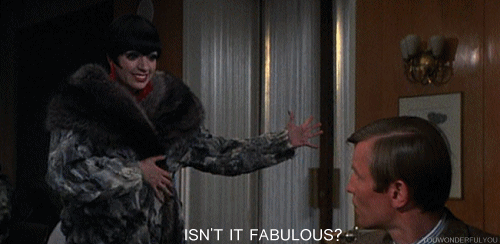
You know what they say about those who don't learn from history...
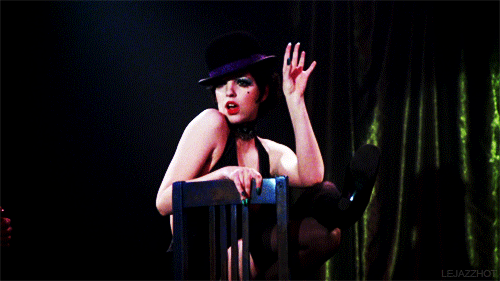








No comments:
Post a Comment